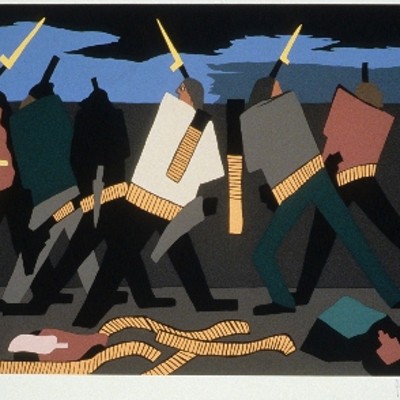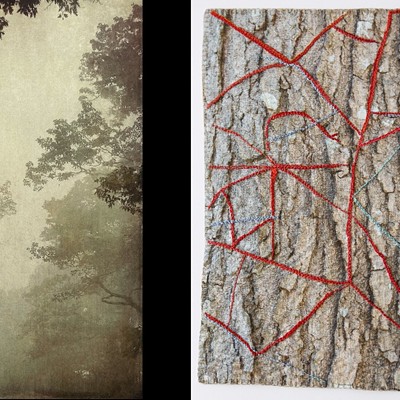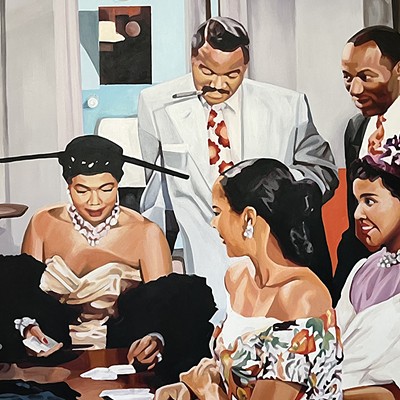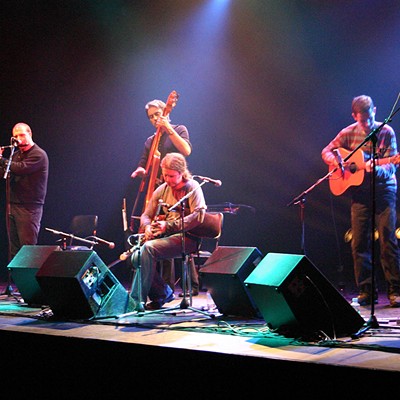"It's tough to get used to," says Allan Glassman, the tenor who sings the lead role of Riccardo this Saturday evening. "You don't want your voice to be dry. Normally I drink a gallon of water during a performance. Here I drink two."
Glassman has had a sterling career singing with such top-ranking companies as the Metropolitan Opera and New York City Opera. He has sung 70 different operas, but this is the first time he's tackled the part of Riccardo, governor of New Orleans. (Glassman alternates the part with Craig Sirianni, who sang in Arizona Opera's André Chenier last season.)
Riccardo is an unusually grueling role.
"The only time I'm not on stage is (one scene) in the third act," Glassman exclaims. "This is one of the most challenging parts in opera. We've had to memorize so many words (in Italian)! And it's so difficult to sing. But this opera is one of Verdi's best, and I love Verdi."
Riccardo's tough arias demonstrate the range of Verdi, a composer beloved for his melodic lyricism. In Act I Riccardo sings the lively "La revedrà nell'estasi," a cheerful ode to romance, but by Act III he sounds the despairing notes of "Forse la soglia."
Arizona Opera, borrowing sets and costumes from Utah Opera, voluntarily changed the setting for its season closer, but Verdi was forced to alter his because of political pressure. Verdi's long and successful career in opera -- he wrote more than 30 operas over a 50-year-period -- was played out during a time of political turbulence in Italy. Born in 1813 in the wake of the Napoleonic wars, as a baby Verdi and his mother narrowly escaped massacre. A divided Italy was still under the control of Spain and Austria, and Verdi was sometimes seen as a symbol of Italian nationalism. Crowds shouting "Viva Verdi" were also invoking the name of the pretender to the Italian throne. The name Verdi was an acronym for Vittorio Emmanule Rè d'Italia, or Victor Emmanuel, King of Italy.
When Verdi was composing Un Ballo in Maschera in the late 1850s, Italy was still a few years away from Vittorio's 1861 coronation. Verdi planned the tale around the true story of the murder of a Swedish king, written up in a libretto by Antonio Somma. The nervous Bourbon rulers of Naples, where the opera was to debut, didn't take kindly to a story of regicide. Verdi resisted their censorship at first, but eventually conceded, switching his setting, rather incongruously, to politically safe Puritan Boston. His king became a governor. The opera premiered in February 1859, a full year behind schedule.
The New Orleans version follows the plot closely, while allowing for an exotic set jazzed up with French ironwork balconies and New World streets.
"This is 1860s New Orleans," explains Glassman. "I'm playing the governor. Everyone respects me but there are always people who don't like me. They're trying to get me out of office. They're trying to get my friend Renato in on the plot."
Renato, a baritone role alternated by Eduardo del Campo and Brian Montgomery, remains loyal to his friend until he discovers that the governor is in love with Amelia, Renato's wife. (Brenda Dawe and Pamela South alternate the soprano part of Amelia.) Incensed by Riccardo's apparent perfidy, Renato joins the conspiracy and sets the stage for Riccardo's murder at a masked ball.
"I die at the end," says Glassman cheerfully. "This is opera."
Arizona Opera presents Guiseppe Verdi's Un Ballo in Maschera at 7:30 p.m. Friday and Saturday, and 2 p.m. Sunday, March 10 through 12, at the TCC Music Hall, 260 S. Church Ave. The opera is sung in Italian, with English surtitles, and accompanied by an orchestra. Tickets are $17 to $67, available through the TCC box office (791-4836), Arizona Opera (293-4336) and Ticketmaster (321-4336).











